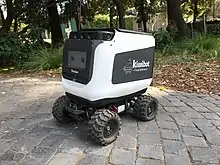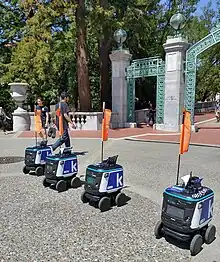Kiwi Campus
Kiwi Campus, commonly referred to as Kiwi, is a Colombian-owned startup company providing food deliveries in California, United States, using largely autonomous robots called Kiwibots. Started in 2017 at the University of California, Berkeley, the company also delivers to parts of the city of Berkeley, on the Stanford University campus in Palo Alto, and in San Jose.

Operations
Kiwi uses three kinds of robots: one to collect prepared orders from the restaurant, a semi-autonomous tricycle in which orders are sorted and taken most of the way to the delivery point, and a small four-wheeled "Kiwibot", which can carry up to five orders and four of which can fit aboard the tricycle, that navigates the last approximately 300 meters to the customer.[1][2] The company claims an average delivery time of 27 minutes.[2] The Kiwibots have digitally animated eyes; the customer gestures to cause the hatch to open.[3][4]
The delivery robots, which are manufactured in China and assembled in Berkeley, have approximately a cubic foot of cargo space.[5] They have six cameras and binocular vision[6] for navigation and hazard avoidance and are largely autonomous; human operators at the company's center in Bogotá monitor their progress at waypoints and take control when needed,[5][7][8] such as when crossing streets.[9] They use artificial intelligence and machine learning, including deep learning, and autonomously modify their speed on sidewalks depending on the proximity of people.[8][10] Initially an iPhone on top of the robot was the primary sensor, robots had to be trained with repeated runs on each route, and rough sidewalks caused problems for the small wheels, requiring careful human monitoring.[11] When a robot encounters a serious problem, such as tampering or becoming lost because of imprecise GPS, the run is completed by a human on foot or on a Segway.[5]
History
Kiwi Campus grew out of a courier delivery service started by Felipe Chávez, the CEO, in 2015 in Bogotá. In 2016, he founded the current company with CTO Jason Oviedo[12] and COO Sergio Pachón[4] in the University of California, Berkeley's Skydeck business incubator,[2] soon substituting robots for human couriers after discovering the cost in the United States;[4][13] he has said that he was shocked to find that when he ordered a pizza online (or, in an alternate version, a burrito),[11] the delivery charge was almost as high as the price of the pizza.[1][9] They first tried using a single robot for the entire distance between restaurant and delivery, but found that inefficient.[1]
The prototype Kiwibots were rolled out on the Berkeley campus in March 2017;[4][7][11] as of May 23, 20 were operating on campus and in surrounding parts of the city.[13] By early 2018 they were also operating on the Stanford University campus,[14] and by late May 2018 they had filled more than 10,000 orders[1] and were operating throughout the area bounded by Cedar and Sacramento Streets and Ashby and Piedmont Avenues.[2] That month the company was planning expansion to the city of Palo Alto and to San Jose and Los Angeles in the remainder of 2018.[2] They are also planning to expand into business to business deliveries.[8] Chávez won an entrepreneurship award from MIT in November 2018.[6]
In December 2018, a Kiwi delivery bot caught fire near the Berkeley student union because of a defective battery; a passerby used a fire extinguisher to put out the fire, and the company temporarily switched to human courier deliveries.[15][16]

In August 2019, a pilot program in Sacramento was announced.[17] In July 2020, the company began service in San Jose.[18]
References
- Brian Heater (May 26, 2018). "Kiwi's robots deliver food to hungry Berkeley students". TechCrunch.
- Will Kane (May 31, 2018). "Those four-wheeled robots on campus, explained". Berkeley News. University of California, Berkeley.
- Scott Martin (September 10, 2018). "Kiwi Delivery Robots Tackle Student Snack Attacks". Nvidia.
- Coby McDonald (February 26, 2018). "Forget the Robot Apocalypse. Order Lunch". California. Cal Alumni Association.
- Bradley Berman (November 7, 2019). "Burrito Delivered by Bot, as Long as Students Don't Trap It". The New York Times.
- Juan Miguel Hernández Bonilla (November 25, 2018). "Cuatro colombianos, entre los más innovadores de Latinoamérica". El Espectador (in Spanish).
- Kate Tinney (May 15, 2017). "New food delivery service Kiwi brings robots to campus". The Daily Californian.
- Loren Moss (September 18, 2018). "Interview: Kiwi Campus, a Colombian-Californian Startup, Is Rolling Out Autonomous Food Delivery in Berkeley". Finance Colombia.
- Ken Hanly (May 27, 2018). "Kiwi robots deliver food for Berkeley campus students". Digital Journal.
- Niall Firth (December 8, 2017). "Food delivery robots are teaching themselves how to cross roads". New Scientist (subscription required).
- John Ramos (May 16, 2017). "Start-Up Uses Robots To Deliver Food To Hungry UC Berkeley Students". San Francisco: KPIX-TV.
- "Kiwi's Little Robot That Could (Deliver The Last Mile)". PYMNTS. June 1, 2018.
- Cirrus Wood (May 23, 2017). "Nosh: Why yes, those are robot delivery minions at UC Berkeley". Berkeleyside.
- Clara Spars (February 22, 2018). "Kiwi Bot: an introduction to the robot-angel of food delivery". The Stanford Daily.
- Sophia Brown-Heidenreich (December 14, 2018). "KiwiBot catches fire outside Martin Luther King Jr. Student Union". The Daily Californian. Updated: "Delivery robot bursts into flames at UC Berkeley". San Francisco Chronicle. December 16, 2018.
- "Kiwibot delivery robot catches fire after 'human error'". BBC News. December 17, 2018.
- Marlei Martinez (August 21, 2019). "Food delivery robots to arrive in Sacramento: What you need to know" (with video). KCRA.
- Madeline Wells (July 21, 2020). "'We've more than tripled our robot delivery fleet': Is the rise of restaurant robots here?". San Francisco Chronicle.